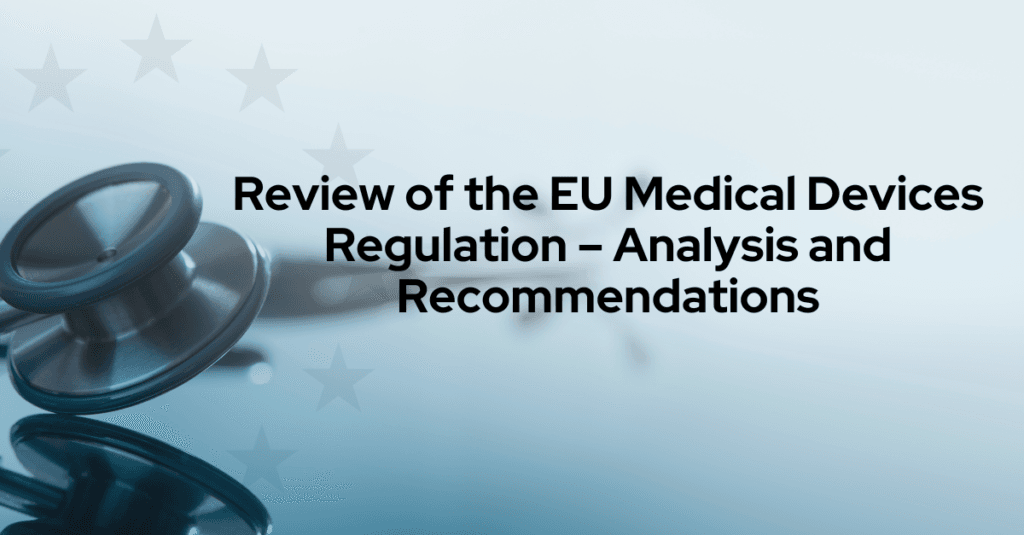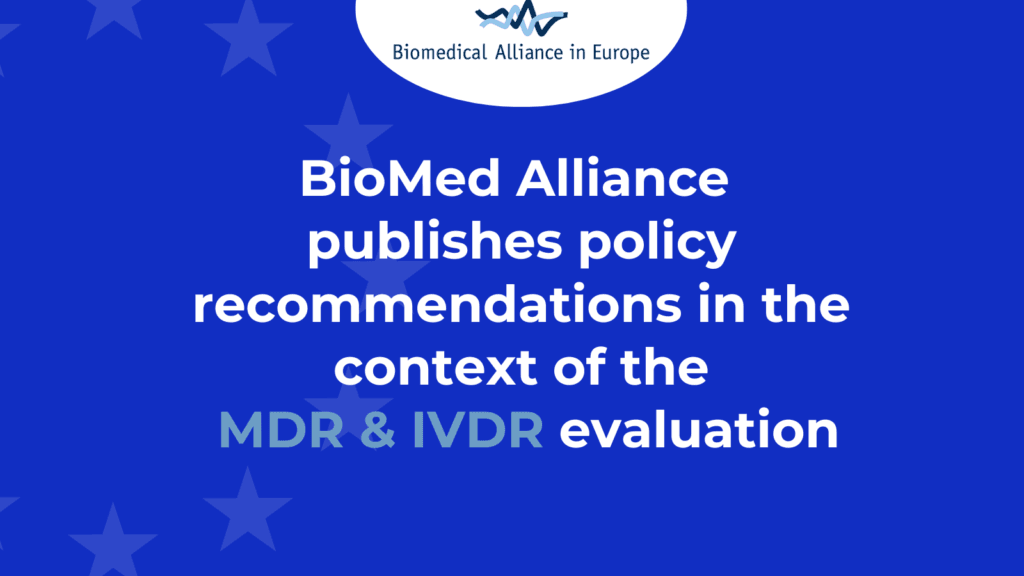Medical Devices
Description
In this task force, high-level experts in this field discuss the latest developments in the regulatory framework for medical devices. They exchange key insights and interpretations of the EU medical devices framework and identify areas where the BioMed Alliance can provide input and expertise to enhance the safety of medical devices in Europe. They also explore opportunities for reaching out to key stakeholders and organisations in the medical devices field, both within Europe and beyond.
Chair
This task force is chaired by Prof. Alan Fraser and Prof. Per Kjærsgaard-Andersen.
Board Representative
The Board Representative for the Committee is Prof. Sanja Kolaček.
Highlights

Press release
BioMed Alliance publishes new comprehensive review of regulatory framework for medical devices and IVDs
Brussels, 25 March 2025 – The Biomedical Alliance in Europe (BioMed Alliance), representing 35 leading medical and research societies, has published a comprehensive review detailing basic principles and practical solutions to address the persistent challenges in the implementation of the Medical Devices Regulation (MDR) and In Vitro Diagnostics Regulation (IVDR).
The report highlights key issues that threaten patient care and medical innovation, including:
- Excessive certification costs creating financial burdens for manufacturers
- Insufficient clinical evidence and lack of transparency in regulatory processes
- Limited access to orphan and paediatric devices, jeopardizing patient care
- Increasing risk of devices being withdrawn from the EU market due to regulatory complexity
- Barriers to innovation that stifle research and development
- Increasing regulatory complexity adding uncertainty to the system
- Fragmented governance leading to inconsistencies in implementation across Member States
- Enhancing regulatory efficiency by streamlining certification processes and increasing the capacity of notified bodies.
- Establishing a new coordinating division at the European Medicines Agency (EMA).
- Ensuring patient access to critical medical technologies by improving market availability.
- Strengthening support for innovation to foster the development of new medical devices.
- Increasing transparency and stakeholder engagement to create a more predictable regulatory environment.

News
New Policy Recommendations focus on Key Shortcomings in MDR & IVDR
The BioMed Alliance has released two policy documents which include recommendations of healthcare professionals to address persisting challenges in the implementation of the Medical Device Regulation (MDR) and the In Vitro Diagnostic Medical Devices Regulation (IVDR). While these regulations aim to enhance the safety and transparency of medical devices and diagnostics across Europe, there are certain shortcomings that must be addressed in the evaluation process that is currently ongoing.
Clinicians have raised key concerns, including delays in implementation, the limited capacity of Notified Bodies, high certification costs, delayed roll-out of EUDAMED and reduced patient access to essential devices—particularly for paediatric and orphan devices. Furthermore, increased requirements for diagnostic laboratories under IVDR threaten the availability of essential diagnostics.
To address these pressing issues, the BioMed Alliance calls for urgent action to establish a patient-centred regulatory framework that is transparent, consistent, evidence-based, risk-proportionate, flexible, efficient, and interactive.
BioMed Alliance’s policy recommendations emphasise the need for a new coordinating mechanism to tackle critical systemic challenges, such as:

- Excessive certification costs
- Insufficient clinical evidence and lack of transparency
- Limited access to orphan and paediatric devices
- Increasing risk of devices being withdrawn from the EU market
- Barriers to innovation
- Increasing regulatory complexity
- Fragmented governance


News
Your Expertise Needed: Apply to EMA SAGs and EU MD/IVD Panels
 The European Medicines Agency (EMA) is calling for experts to join its Scientific Advisory Groups (SAGs) as part of the upcoming mandate renewal. These advisory groups, managed by the Committee for Medicinal Products for Human Use (CHMP), provide crucial scientific expertise in areas such as quality, clinical, non-clinical, and methodology domains. Experts contribute to scientific evaluations, marketing authorization applications, and the development of scientific guidance documents. Applications for the medicinal products call are open until December 15, 2024. More info available here.
BioMed Alliance also reminds you of the separate call for experts in the fields of In-Vitro Diagnostics (IVD) and Medical Devices (MD) for the European Commission. The demand for expertise in MD and IVD remains critical, as emphasized during our recent Training Day. The need for qualified professionals in these areas is urgent, and this call offers an excellent opportunity to contribute directly to the development of EU regulations, ensuring the safety and efficacy of health products across Europe. ghfghh fghhdfgfghjghjhsdd ghgdf gh sdfh hjhdf sdfh df frd
For more details on the call visit the link here.
The European Medicines Agency (EMA) is calling for experts to join its Scientific Advisory Groups (SAGs) as part of the upcoming mandate renewal. These advisory groups, managed by the Committee for Medicinal Products for Human Use (CHMP), provide crucial scientific expertise in areas such as quality, clinical, non-clinical, and methodology domains. Experts contribute to scientific evaluations, marketing authorization applications, and the development of scientific guidance documents. Applications for the medicinal products call are open until December 15, 2024. More info available here.
BioMed Alliance also reminds you of the separate call for experts in the fields of In-Vitro Diagnostics (IVD) and Medical Devices (MD) for the European Commission. The demand for expertise in MD and IVD remains critical, as emphasized during our recent Training Day. The need for qualified professionals in these areas is urgent, and this call offers an excellent opportunity to contribute directly to the development of EU regulations, ensuring the safety and efficacy of health products across Europe. ghfghh fghhdfgfghjghjhsdd ghgdf gh sdfh hjhdf sdfh df frd
For more details on the call visit the link here.
Event
Join Us for a Workshop on the Future Directions for EU Medical Devices & IVD Regulations!
Join us for an in-depth workshop focused on the key challenges surrounding the implementation of the Medical Devices Regulation (MDR) and In-Vitro Diagnostics Regulation (IVDR), particularly in light of the ongoing evaluation process. This event will bring together key stakeholders from across the medical devices landscape to engage in meaningful discussions. We will explore critical issues such as limitations in clinical evaluation, challenges associated with the use of in-house IVDs, and the reduced availability of essential devices in Europe.
In addition to expert presentations, the workshop will feature interactive roundtable discussions where participants will collaborate to identify solutions on the way forward. The event will be followed with a networking cocktail!
Register here!

Statement
New statement advocates for a balanced approach to phasing out PFAS
In a new statement, BioMed Alliance provides insight on the harmful impacts of Per- and polyfluoroalkyl substances (PFAS) and urges manufacturers of medical devices to find safe alternatives whilst ensuring that essential devices don’t disappear from the market. The statement advocates for a balanced approach for the phasing out of PFAS by advocating for research on finding alternatives as well as facilitating the use of exemptions for a limited time period in order to avoid the loss of medical devices from the market.



Statement
New statement raises awareness on urgent deadline to avoid medical devices from disappearing
In a new statement, BioMed Alliance highlights its concerns regarding an imminent deadline in the Medical Devices Regulation (MDR), which will manufacturers have to meet to keep their devices on the market. It is foreseeable that devices may be withdrawn from the European market in the coming period, which could lead to shortages of medical devices.
As of 26 May 2024, manufacturers will be required to meet a critical deadline for legacy devices, in order to benefit from the extended transition periods. By this date, they will need to have applied for conformity assessment under the new regulation with a notified body, and have a MDR Quality Management System (QMS) in place. Due to several reasons including the high costs of certification, manufacturers may decide not to apply for MDR and their devices will thus not benefit from the extended transition period after the 26th of May. Particularly devices for small patient groups, such as paediatric and orphan devices may be affected. In response, the statement provides both short and long-term recommendations aimed at preventing the potential loss of medical devices.



Statement
Statement raising awareness on urgent deadline to avoid medical devices from disappearing
In a new statement, BioMed Alliance highlights its concerns regarding an imminent deadline in the Medical Devices Regulation (MDR), which will manufacturers have to meet to keep their devices on the market. It is foreseeable that devices may be withdrawn from the European market in the coming period, which could lead to shortages of medical devices.
As of 26 May 2024, manufacturers will be required to meet a critical deadline for legacy devices, in order to benefit from the extended transition periods. By this date, they will need to have applied for conformity assessment under the new regulation with a notified body, and have a MDR Quality Management System (QMS) in place. Due to several reasons including the high costs of certification, manufacturers may decide not to apply for MDR and their devices will thus not benefit from the extended transition period after the 26th of May. Particularly devices for small patient groups, such as paediatric and orphan devices may be affected. In response, the statement provides both short and long-term recommendations aimed at preventing the potential loss of medical devices.
